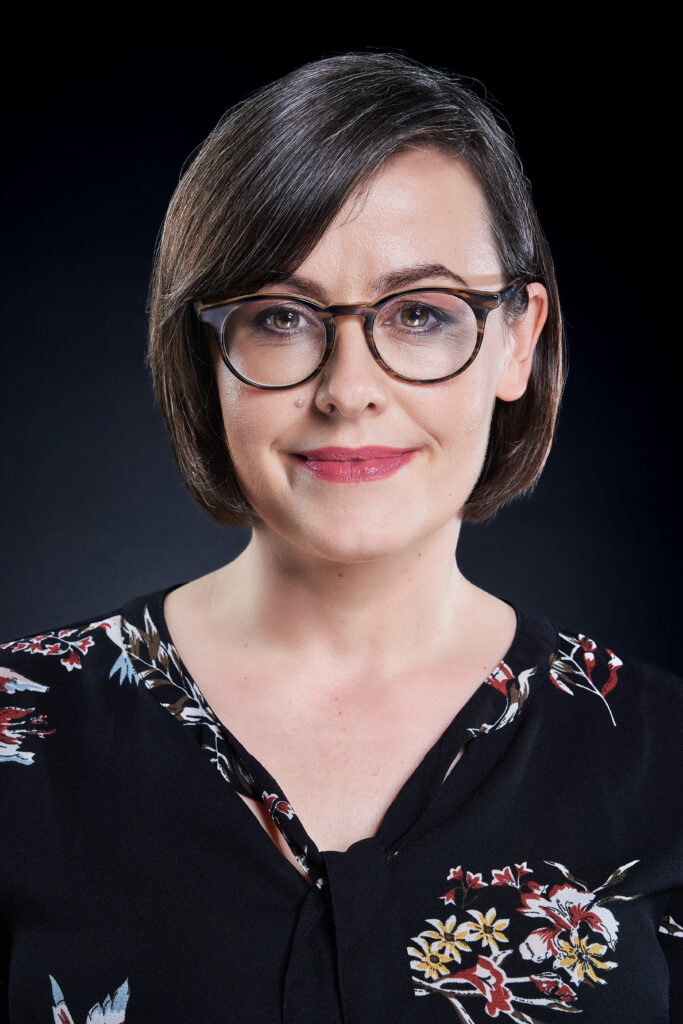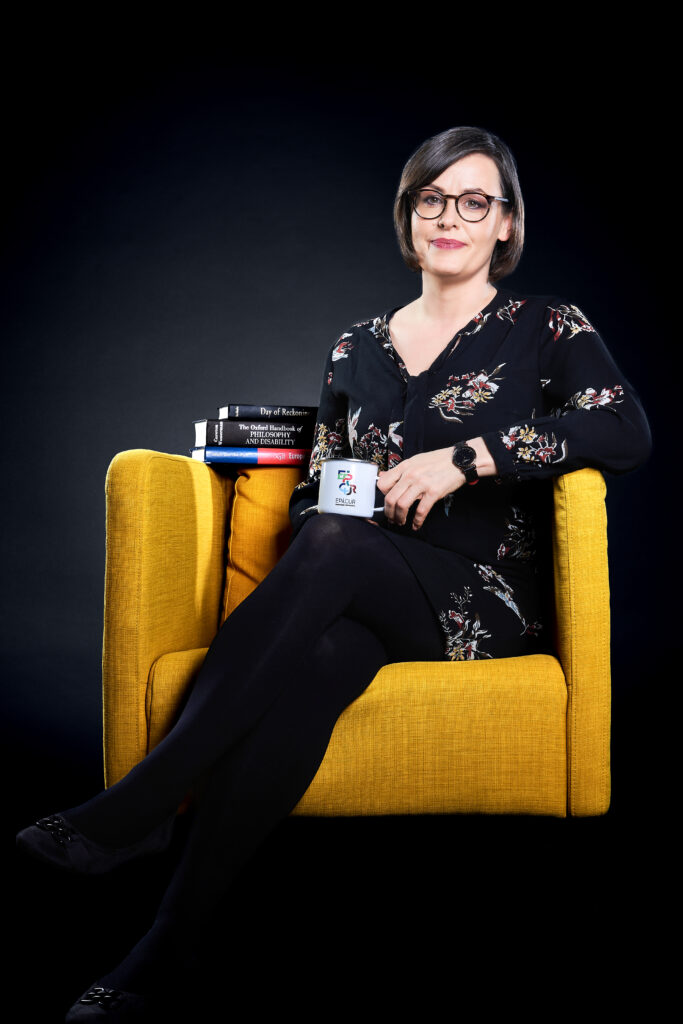From Virginia Woolf and Judith Butler to EPICUR? – a portrait of Dr. Kerstin Fest

Hardly anyone knows ‚university‘ from as many sides as Kerstin Fest: she studied, earned a doctorate, researched, taught and now finally arrived in science management. Her career at the university has taken her from literary studies to today, where she is involved in the planning and implementation of a European university. The warm-hearted Austrian began her studies in Salzburg in 1995, a long way from knowing that she would also make the university her workplace. At the time, she turned her love of literature and English culture into a degree in German and English studies, the latter of which she particularly enjoyed. While still a student, she fell in love with the works of Virginia Woolf, who impressed her as the one iconic woman in the rank of male authors in the classical literary canon.
Today, she still sees herself strolling alongside Mrs. Dalloway when she walks the streets of London. After a year of being a teaching assistant in Minnesota, Kerstin Fest landed a doctoral position – rather by chance – in Germany and for the first time at the Albert Ludwigs University in Freiburg. After realizing that doctoral theses on Virginia Woolf already abounded, she decided to pursue her special interest in women in literature nevertheless. She studied the construction of female identity in several modern novels by female authors of the early 20th century. After receiving her PhD, Kerstin Fest moved abroad and spent several years in Cork, Ireland, where she mainly taught at the Department of German Studies. Finally, she returned to her alma mater, the University of Freiburg, in 2013, where she devoted herself to English studies again.
Throughout these years as a teacher and researcher, Judith Butler has been a particularly influential thinker for Kerstin Fest. Her concept of performance, explained in Butler’s Gender Trouble (1990), comes to Kerstin Fest’s mind again and again when she encounters the differences between men and women in a university career. Butler shows how the behaviors of individuals of a particular gender are significantly shaped by how these very genders are performed. That is, they are not intrinsically and naturally present, but are „acted out“. Through this performance, (gender) roles are then naturally reproduced. Kerstin Fest understands that this idea can also be unsettling for some. „It’s not like I’m proclaiming it all the time and saying I’m just a performer,“ she laughs. However, she finds that the idea is useful in order to better classify some processes in her environment.
Particularly in her work at the university, she notices time and again that it is the women who make coffee, set up tables or, as lecturers, worry before their seminars about whether they dress too much like their female students. It also doesn’t escape her notice how it is always subliminally assumed that female doctoral students will disappear into the family in their thirties anyway. A part-time academic career is hardly possible – or so the eternal message goes. As a lecturer, Kerstin likes to forbid her female students to always apologize before speaking in seminars. For her, the typical phrases „I don’t quite know if this fits here…“ or „I’m not quite sure, but…“ are clearly part of the performance se regularly finds herself guilty of as well. Despite all this and apart from these small, subtle differences, Kerstin Fest rarely felt disadvantaged as a woman at the university. In her subject, she was often part of a predominantly female faculty, even if the literary canon is – unsurprisingly – still very male.
Nevertheless, she experienced the enormous pressure that young scientists today find themselves under. Habilitating, teaching, researching, traveling to conferences, competing for positions and publishing incessantly – in what she calls a „creative crisis,“ Kerstin Fest finally made the decision to look for new horizons. She came across a position in science management at the University of Freiburg for the EPICUR project, which she is now leading in its second funding phase as Institutional Coordinator and Project Manager.
Her career, which is so marked by changes, still always seems to be inspired and driven by her hopes and ideas of what a university could be. This also holds true for literature: it is and remains Kerstin Fest’s great love. „It’s a beautiful way to experience the world, to have this access to other consciousness and experiences,“ she says. This very access to new stories and perspectives makes her hopeful for the future. She advocates for the advancement of literary studies as an opportunity for better understanding of other narratives. „You can’t do literary studies like you’ve been doing for a hundred years.“ Postcolonial perspectives, feminist fantasies, minority musings, Gen-Z genre-bending, or anything else imaginable. „Writing and storytelling is such a fundamentally human thing that we all do it, regardless of background or origin,“ Kerstin Fest says.

Kerstin Fest’s current hope for the future, however, is the European university: „Knowledge itself is important to me, but so is creating a context and an infrastructure for this knowledge. The EPICUR project, which she coordinates in Freiburg, was launched due to the initiative of the European Commission. The goal is to create attractive and innovative European universities of the future. EPICUR is one of 43 projects of this kind throughout Europe. Students from the nine partner universities in six different countries can already choose from a common course catalogue and take online classes.
Her newfound passion for creating spaces for knowledge, learning and research across borders also gives her the opportunity to contribute her experience: „I now see my experience with research and teaching – also internationally – as an advantage.” This way, she can better empathize with the interests and needs of teachers and students. Kerstin Fest finds the change to this new field of work liberating: „I still do research, I’m at a conference or write an article every now and then, but the pressure is off.“
Looking back on her varied and diverse career at the university, Kerstin Fest says, „I was never quite strategic about it, it was always more lucky coincidences.” She repeatedly shown the bravery to venture into the unknown, to take on new challenges, and to bring her own ideas and passion to the table. Where she has arrived now suits her very well, even if she can see herself returning to her Austrian homeland in at some point in the distant future.
Portrait by Cosima Banulus-Nessler
After 4 years of studying Liberal Arts and Sciences (thanks to Covid mostly completed in trains and cafés), Cosima is finally about to graduate with a Bachelor’s degree and is looking forward to new, exciting projects (maybe an exciting Master’s degree – or just enjoying a cappuccino without a laptop on her lap). She likes to spend her free time either listening to music or making it herself; the remaining time she invests in Settlers of Catan and a never-ending pile of books.